Creativity, Best Practices & Absenteeism at Croatia 365 Conference in Zagreb
September 25, 2019 - The 3rd edition of 'Is Croatia 365 Tourism Possible?' took place at the Zagreb Sheraton yesterday, a fascinating event on so many levels, and with many thought-provoking ideas and questions.
I am developing a mild obsession with the culture of the Croatian conference.
Having hardly been to a Croatian conference until about two years ago, I find myself attending a couple of month on average. I find them incredibly useful in general, both from the content of both Croatian and international speakers, as well as a chance to network and make connections for the greater good of TCN. But I also notice some recurring themes:
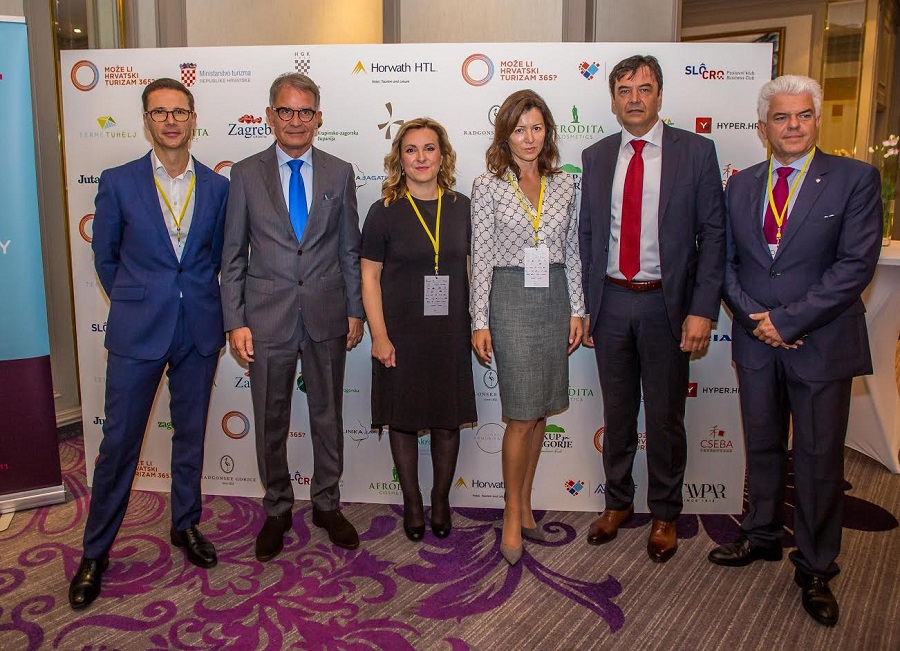
The conferences usually start with a photo shoot with the great and the good of the conference, as was the case at yesterday's 'Is Croatia 365 Tourism Possible?' in Zagreb.
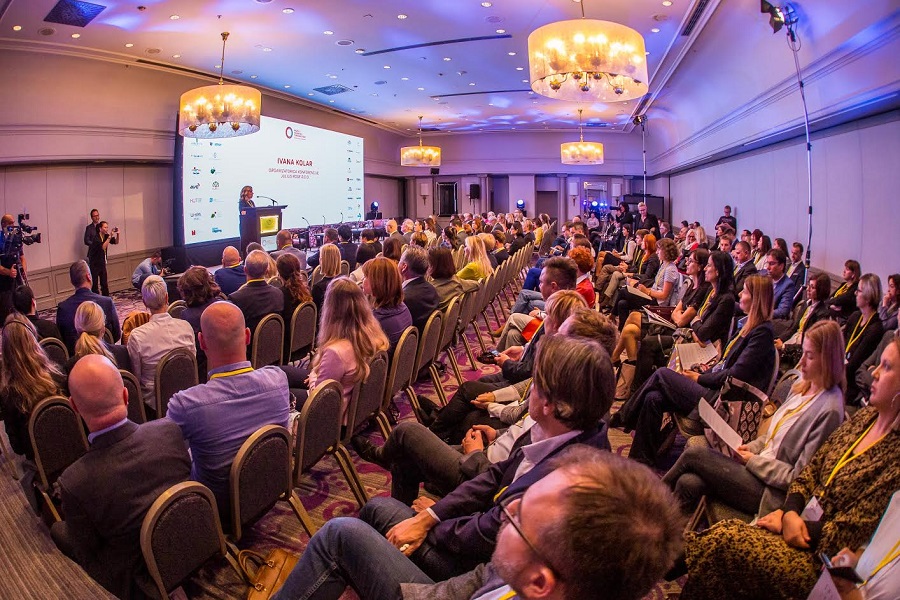
There is often a photo from the opening session showing just how full and successful the conference is, such as the one above.
And then, of course, the official PR press release which mentions all the names of the great and good, often with a quote from each of the speakers. A permanent online reminder of another successful conference attended by the key officials working tirelessly to do their job and carry out their public service.
If only...
I found yesterday's conference extremely interesting, with lots of take-home ideas for me personally. There were some great ideas presented, as well as some rather controversial topics touched on, and it would have been great to have had the engagement of those key officials in those discussions.
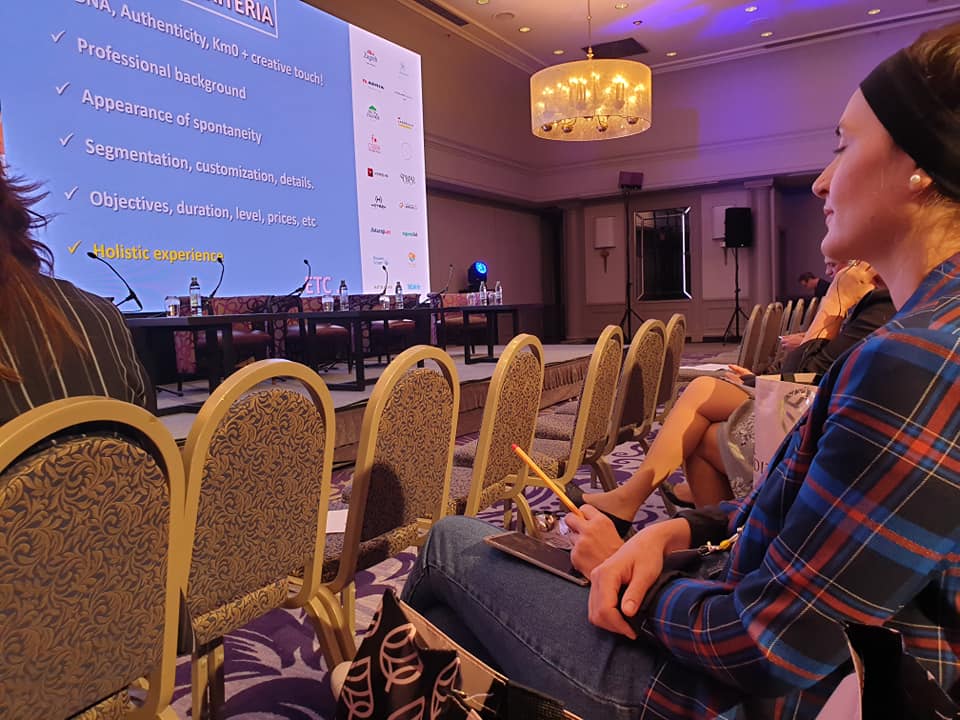
But this is the reality, conference after conference, of what happens in Croatia. As soon as the brights lights have gone and soundbites given, the key officials disappear to wherever it is they go. Of course ministers are busy, I understand that, but in addition to being rather insulting to the international speakers flown it at great expense to address them, if our tourism officials are not present to listen to the ideas, suggestions and best practices of the experts, what is the point?
Unless our tourism chiefs already know everything of course...
And it is not just the big conferences. Even I was embarrassed as a foreigner at a boutique health tourism seminar last year. Designed specifically stakeholders from Croatia's medical tourism industry and by invite only, an American medical tourism branding specialist was flown in to hold an intensive workshop with stakeholders to work on developing Croatia's medical tourism brand.
Despite confirmations, neither the Ministry of Tourism or Croatian National Tourism Board bothered to show up. When I asked the tourist board about the no show, they insisted that they had been present in a room of just 15 people, before later acknowledging that they had got confused with another conference a month later.
Health tourism is one of the key strategic goals of the ministry's 7-year plan, and global experts agree that Croatia has the potential to become one of the world's top 10 medical tourism destinations in 10 years if its stakeholders can unite.
Six years into the 7-year plan and we still don't have a task force committee.
But let's return to yesterday and the potential of Croatia 365 tourism, the subject of one of the eternal discussions of Croatian tourism - how to lengthen the season.
it is now five years since the launch of the high-profile Croatia 365 project, a concept lifted entirely from the UNWTO Punta del Este 365 (as previously reported on TCN). Five years later, I am struggling to find evidence of the original Croatia 365 project online, although Uruguay 365 lives on:
I contacted the efficient national tourism board PR department for an update on how the project is going and will add to the article when they respond. But I do remember that the last update we reported on Croatia 365 showed that things were not going very well. our article of February 2016 on the subject became the number one story of the day in the Croatian media and let to requests for meetings from the then director the national tourism board and the office of the then Minister of Tourism.
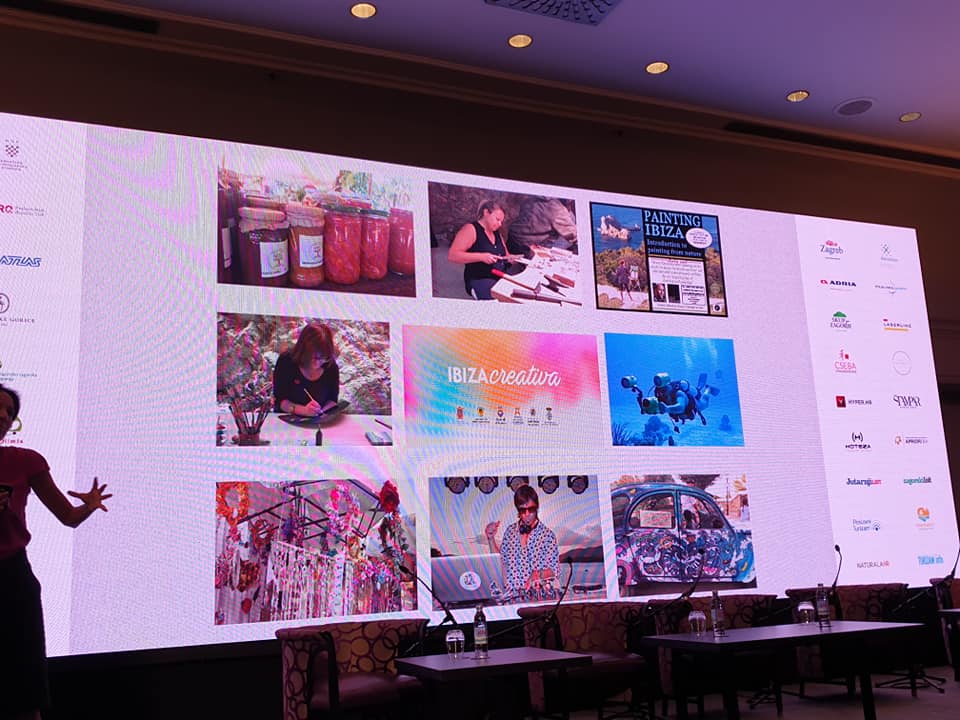
The two most interesting sessions at yesterday's conference (for me) were the Forum of Leaders: Tourism 365 panel with Bruno Walter from ITB Advisory, James Howarth HTL London, and moderator Kristian Sustar from Uniline. They were followed by Caroline Couret from the Creative Tourism Network, whose theme was Creative Tourism, or how to create authentic experiences that meet the new traveller's demands.
Couret had a range of impressive examples of how to create stories, bring out the authentic experiences of a region, and entice tourists into activities they might not otherwise have considered. The example of Ibiza Creativa was particularly powerful, as she showed how the famous party destination had succeeded in developing a whole other type of tourism, based on the traditions and indigenous products of Ibiza. And some interesting niche tourism based on the Ibiza party - lessons in how to be a famous DJ, for example.
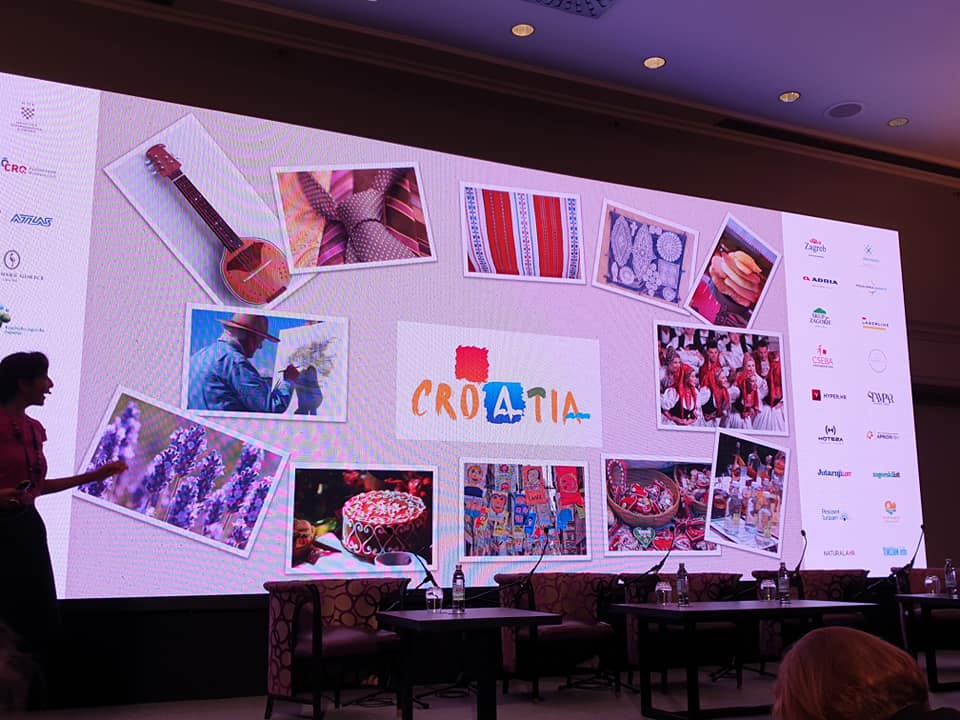
Couret also had some great examples of how Croatia can use its considerable intangible UNESCO heritage to create tourist experiences. Rainy day in Zagreb? Why not go and learn to make a tie in the birthplace of this iconic male style item?
If only there had been anyone in authority there to listen.
But the most interesting exchanges on Croatia's direction came from Brit Chappell, Austrian Walter and moderator Sustar.
Walter talked about how Austria has succeeded in developing its year-round tourism, which used to be seasonal, with guests more or less guaranteed. Then came the charter flight revolution, which meant that guests which they had taken for granted were now flying cheaply to more exotic locations. The development of the next generation of tourism started with unity at the village level and spread from there, with more regional consolidation. Today, he said, the population of Tyrol is about 800,000 and hosts 50 million overnights a year (half of Croatia's national total), and it has streamlined its tourist boards from 143 to 36. Interestingly, he said that the makeup of tourists in Austria is half foreign, half domestic. According to numbers he had seen about Croatia, the balance is 86% foreign and just 14% domestic. So focusing on the local market would be a natural strategy.
He also noted that 94% of Croatia's tourists are leisure tourists and just 6% business. A crazy statistic, chimed in Howath's Chappell, especially when you consider Croatia's potential and the fact that Sweden has 80% year-round hotel occupancy and is a conference Mecca, despite it being dark most of winter.
As always, the lack of flights was cited. As always, the only way to solve this problem is to stop protecting Croatia Airlines and make it easier for budget airlines. If we need a lesson in what happens when a country loses its loss-making national carrier, look no further than the phenomenal success of Budapest Airport, just 7 years after the loss of Malev (very informative interview with Budapest Airport CEO Jost Lammers here).
"When it comes to year-round tourism," said Chappell, "major challenges and problems that tourist countries and destinations face investments and expectations. If you want to have an offer for year-round tourism, it's in the destination need to have the infrastructure to handle it: airlines, accommodations, attractions which operate throughout the year, constant promotion, processes and dealing with guests. It all takes finance and it comes with an element of risk. It takes a certain amount of faith and determination to move in that direction."
Lessons from the Canary Islands, perhaps? A really impressive concrete strategy which has moved tourists beyond the sun and sea stereotype to bring in millions more tourists and engage them in activities they are looking for - check out the video above.
While both were fundamentally positive that the essential ingredients of Croatian tourism were healthy, the same could not be said of the direction, and Chappell - a self-proclaimed fan of Croatia and recently back from a family holiday in Dalmatia - described Dubrovnik with an adjective I have never heard used about the Pearl of the Adriatic before:
"If it carries on like this, in a few years, Dubrovnik will be unvisitable."
Unline's Sustar's moderation was a highlight. Rather than putting forward lame questions, he generated some lively discussions which are discussions which Croatian tourism should be having.
If there was anyone in authority there to listen.
An industry expert, he was clearly frustrated at the direction and leadership of Croatian tourism, telling the panel that while Croatia did indeed have a tourism strategy (our old friend, the 2013 - 2020 7-year plan, whose highlights include 30 golf courses, none of which have been started as 2019 draws to a close), "we have nobody to implement the plan, no leader in charge to create milestones."
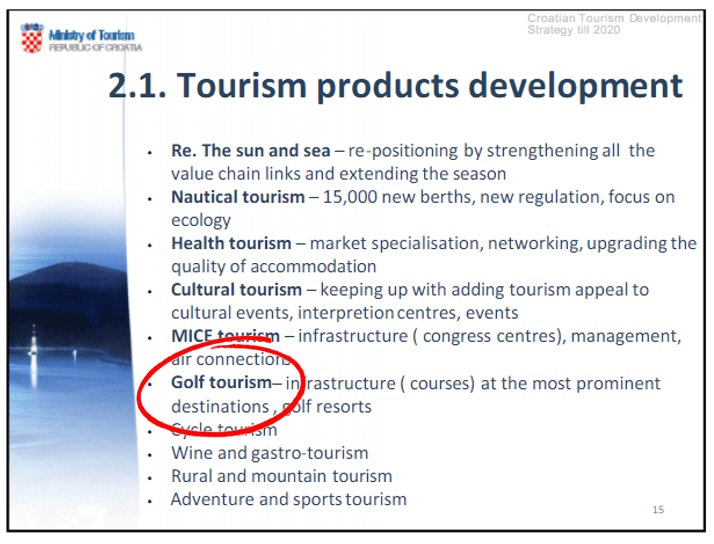
(the key points of the 2013 - 2020 plan)
"Would it be acceptable to bring in an outsider to implement Croatia's tourism strategy?" asked Chappell. He cited the example of the Bank of England, which is run by a Canadian, and his lack of Britishness means he can do some things a certain way. If a region has too much political or historical baggage, sometimes it is better to look abroad from the best solution.
Chappell also made the point that there were two truisms which were important to note. The first is that Croatia has a great and identifiable product - its coast, and that the Croatia 365 challenges are not unique to Croatia. They will have been dealt with in other locations. Rather than trying to reinvent the wheel, learn from and adopt best practices from elsewhere, buying in that expertise if necessary.
It would have been interesting to see those thoughts discussed with our tourism chiefs, but alas...
I am rambling on too much, but I wanted to mention one final topic from the last panel, From Goal to Realisation. Katarina Milicevic from thinktourism asked how many people thought that gastronomy was the most important thing in Croatia's tourism offer after sun and sea. Many did.
She then went on to explain a little about her social media research to show that while Croatian tourism thinks it knows what it is offering, it is not always very good at telling its international tourist audience. She cited some research on the social media activities of the Croatian National Tourist Board and its social media promotion. According to Milicevic, over a 12 month period, CNTB posted over 1,000 times on Instagram, but only 40 of those posts were related to gastronomy, while on Facebook, there were 400 posts, with just 15 related to food and wine.
If we can't tell our tourists what we have to offer, how are they supposed to know?
In a similar way, if we can't find the time to listen to the expert opinions of recognised international experts who have flown in to help us, how are we going to learn?
To learn more about the Croatia 365 conference, visit the official website.
Ražanac Seeks A Tourism Windfall In The Bura
September 13, 2018 — Ražanac blows — in a good way!
Croatia: From Cheap Summer Holiday to Year-Round Destination - How Do We Achieve It?
Year-round tourism is a term on everyone's lips, but just how do we go about actually achieving it?
Meet the Heroes of Croatia 365: Iva Hafner of Run Croatia
Croatian tourism has many inspirational individuals executing their ideas and dreams with little or no official support. In the latest in our series on December 23, 2016, Meet the Heroes of Croatia 365, meet Iva Hafner, one of the co-founders of Run Croatia. Fresh from the success of last weekend's inagural Zagreb Advent Run, Iva talks a little about her ideas to turn Croatia into a quality running destination.
Croatian Tourist Board Meets to Discuss Agenda for 2017
Today, the Head Office of the Croatian Tourist Board (HTZ) held the 7th meeting of the Tourism Council in which, among other things, members of the Council have adopted an annual work program and financial plan for the Croatian Tourist Board for 2017.
Meet the True Heroes of Croatia 365: Martin and Ante Modric from Sucuraj.com
Continuing TCN's look at the real heroes of Croatia 365 on March 16, 2016 - the private initiative versus the official inertia in Sucuraj on Hvar.
Meet the True Heroes of Croatia 365: Adria Bike and HD Navigatio
Continuing TCN's look at private businesses delivering Croatia 365 on the ground, Hrvoje Šepić, Founder and co-owner HD Navigatio on March 9, 2016, to find out how one group of enthusiasts is putting Croatia firmly on the international competitive cycling map.
Meet the True Heroes of Croatia 365: Kino Mediteran
TCN's look at the heroes of Croatia 365 tourism continues on February 29, 2016, with a look at the cinema project Kino Mediteran.
Meet the True Heroes of Croatia 365: Organisers of Dalmacija Ultra Trail
As the flagship tourism project Croatia 365 comes under closer scrutiny, TCN continues its series on February 26, 2016, looking at the people making tourism happen with private initiatives. This week, a fascinating interview with one of the organisers of Dalmatia Ultra Trail, and a glimpse of the massive potential of official support of private initiatives.
Meet the True Heroes of Croatia 365: Luks PZ from Pozega
With the tourist board's Croatia 365 project in the national media, TCN starts a new series on February 22, 2016, looking at the professionals and enthusiasts already delivering year-round tourism options outside the system. By featuring some of these tourism heroes, our hope is to give them wider exposure and encourage the powers that be to include both their programmes and their energy in future planning, for the greater good of tourism. We start with some cycling enthusiasts in Pozega.


